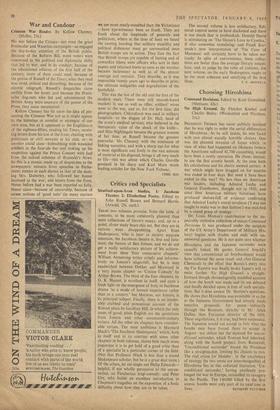Choosing Hiroshima
Command Decisions. Edited by Kent Greenfield. (Methuen, 42s.) PRESIDENT TRUMAN has never publicly doubted that he was right to order the aerial obliteration
of Hiroshima. As he still insists, he was faced with two almost equally horrible choices. One was the planned invasion of Japan which, view of what had happened on Okinawa (where the Americans suffered 41,700 casualties), would have been a costly operation. He chose, instead, ' to use the first atomic bomb. At the time both his calculations and his choice seemed correct. A war which might have dragged on for months was ended in four days. But need it have been ended in this way? No less than six American war leaders, including Admiral Leahy and General Eisenhower, thought not in 1945; and since then American military historians have
produced shelves-full of evidence confirming that Admiral Leahy's moral revulsion CI was not taught to make war in that fashion') was matched by a sound grasp of strategy.
Dr. Louis Morton's contribution to the im- peccably orthodox collection of essays Command Decisions (it was produced under the auspices of the US Army's Department of Military His- tory) begins with doubts and ends with un- answered questions. He is not quite sure whether Hiroshima and the Japanese surrender were causally linked. He quotes General Arnold's view that conventional air bombardment would have achieved the same result and cites General Chennault to the effect that Russia's entry into the Far Eastern war finally broke Japan's will to resist further. No High Ground, a straight- forward though chronologically muddled account of how the bomb was made and its use debated and finally decided upon, is free of such specula- tions. But it does answer Dr. Morton's questions. He shows that Hiroshima was avoidable in so far as the Japanese Government had already made tentative proposals for peace—indirectly through the Russians, directly to Mr. Allen Dulles, then European director of the OSS. These negotiations, it is true, had been suspended. The Japanese would not accept in July what the bombs may have forced them to accept in August—not defeat but the demand for uncon- ditional surrender, which Truman had inherited, along with the bomb project, from Roosevelt. 'Unconditional surrender' bound the President like a straightjacket. limiting his choices to two. , The real crime (or blunder: in the vocabulary of strategy the two terms are interchangeable) of Hiroshima lies in this enforced limitation. 'Un- conditional surrender,' having needlessly pro- longed the war in Europe, intensified its savagery in the Pacific. The 140,000 killed by the first atomic bombs were only part of. its total cost in










































 Previous page
Previous page